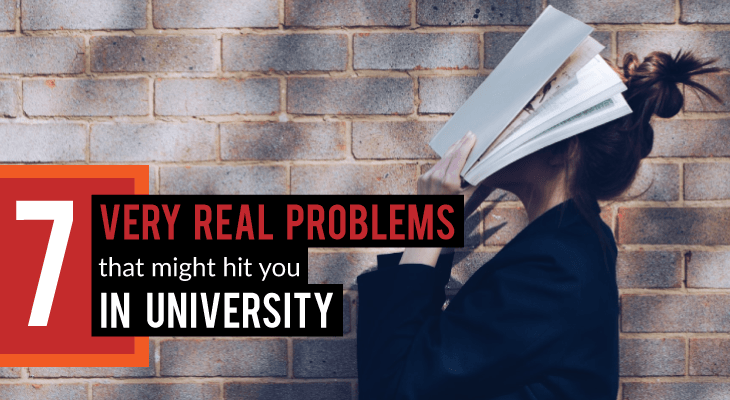7 Very Real Problems That Might Hit You in University
Life is constantly full of challenges and university life is no exception. We walk you through 7 real problems and what you can do about them.
Published 05 Aug 2020

They say that university is the best time of your life. Experiencing newfound freedom, exploring new passions and interests, meeting new people and having loads of fun.
However, university life can also be a time where you face some serious challenges for the first time. Here are some very real problems that you may encounter as a university student and how you can tackle them head-on.
#1. Feeling like a fraud

So, you’ve started university for a couple of months now and everything seems kind of perfect. Your lecturers recognise you, you’re scoring good grades on your assignments and you’ve got a pretty awesome social life. That’s you on the outside. But what about you on the inside?
Well, there’s just one problem — you feel like a fake. You can’t help but think that every single achievement so far has been an endless streak of luck. And you’ll soon be exposed for the fraud that you are.
When such thoughts of inadequacy bug you, you’re probably dealing with “imposter syndrome”, a condition where you feel like you do not deserve all that you have achieved. It’s a relatively common occurrence among university students, especially those in top schools.
To address this, reach out to a trusted friend, preferably one who isn’t in the same programme as you, to talk it out. It’s also important to take the time to review your accomplishments, write down why you deserve what you have achieved and revisit this from time to time.
#2. Struggling to cope with studies

No matter how many times you read your lecturer’s notes, you just can’t seem to get it. The concepts go right over your head despite paying full attention during class and hours of additional study. On top of that, you’re also struggling with the workload and your grades are starting to suffer.
If you’re starting to panic, don’t worry — you’re not alone. The leap from secondary school to college is a big one and can catch many by surprise.
Instead of constantly going back to square one and suffering in silence, make an appointment with your lecturer to discuss your challenges or check in with your coursemates to see if they can offer a different perspective. It’s also worth searching on Google to see if there’s any advice on how to solve the problem.
#3. Experiencing depression or a mental breakdown

Do you feel like you’re battling an internal struggle that no one would understand? While you may be happy and sunny on the outside, in reality, you are overwhelmed on the inside.
The truth is, depression and mental illness among university students is very real. A study conducted at the International Islamic University Malaysia found that 36.4% of health science students had at least some form of mild depression.
If you’re experiencing symptoms of depression or find yourself having a mental breakdown, it’s important to seek professional help immediately. Most universities have a counselling centre that you can reach out to. Alternatively, you can also speak to the Befrienders or contact any of these counselling services.

#4. Dealing with health problems

Let’s face it — university students never have the best lifestyle habits, what with the late-night partying studying, unhealthy eating habits and erratic sleeping hours. Moreover, poor mental health can also negatively impact your physical health.
Whether you suddenly find yourself gaining a huge amount of weight (there’s a reason why there’s a term called “freshman 15”, a phenomenon where first-year students are said to gain 15 pounds), you’re always coming down with a cold or you generally feel weak and lethargic, it’s crucial to keep your health in check. Otherwise, it could manifest into something bigger.
Some quick tips — make sure to sneak in some healthy meals a couple of times a week, establish a regular sleeping schedule and work in some simple exercises to get your heart rate pumping.
Apply for university with EduAdvisor
Secure scholarships and more when you apply to any of our 100+ partner universities.
Start now#5. Facing financial issues

In this tough economic climate, things can be rather uncertain. Your parents may suddenly find themselves unable to support your education, forcing you to make some hard decisions.
While it may seem like it’s the end of the world, rest assured that there are some viable options.
For starters, you can try to apply for study loans (e.g. PTPTN) or speak to your university to see if there are any financial aid that you are eligible for.
If that’s not sufficient, there’s no shame in deferring a semester or two while your financial situation clears up. You can always take up whatever jobs that come by, save up and continue your degree later on when you have enough funds.
#6. Getting over a bad breakup

Life is all sunny and rosy with the guy or girl of your dreams till, wham! You wake up one day to an ugly breakup. The person who you thought you'd be walking down the aisle someday is now gone from your life and your world comes crashing down.
All of a sudden, everything you used to enjoy doing is now meaningless. You find yourself experiencing an emotional rollercoaster. To distract yourself, you start indulging in too many video games and shrug off studying. Eventually, your grades start to slide too.
Yes, breakups can be really hard. Grant yourself a duration of time each day to reflect on the relationship and take the time to go through the stages of grief. When you finally move on from the crossroads you’re stuck at, the rest of your life can fall back into place, including your studies.

#7. Experiencing negative peer pressure

University can bring about new and exciting friendships. Unfortunately, you may also find yourself pressured to doing things that you don’t really want to, such as staying out too late the night before an exam or trying out some illicit drug.
So what’s the best solution out of these tricky situations, especially when the peer is a good friend or a coursemate?
If you don’t want to reject your friends outright, you can always try stalling or changing the subject. It’s also useful to pull out the “my parents will kill me” card every now and then. But if the pressure gets too much and they don’t seem to be respecting your boundaries, don’t be afraid to walk away from the friendship.






